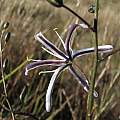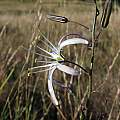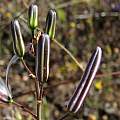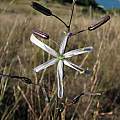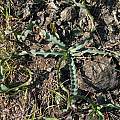Ring Mountain is located at the northern end of the Tiburon Peninsula in south central Marin County. This 602 feet high mountain has distinctive mineralogy, flora, fauna, and Indian petroglyphs. Rocks on the mountain are part of the Franciscan Complex and are associated with many different minerals. The Mountain is capped by large sheets of serpentine that range from 10 to 50 feet thick and are probably more than 150 million years old. The Nature Conservancy acquired title to 377 acres in 1985 and has created a wildlife preserve that is open daily year-round. Collecting of rocks or plants is prohibited. There is a 1 1/2 mile moderately steep trail loop. Spring wildflowers are at their best from April through June. Three notable plant species occur naturally only on the harsh serpentine soils of the Tiburon Peninsula: Castilleja neglecta, Streptanthus niger and Calochortus tiburonensis.
Allium lacunosum var. lacunosum was photographed by Nhu Nguyen. This taxa occurs on serpentine outcrops by the thousands. The petals fade to a rusty brown and are persistent as the seeds mature.
Brodiaea elegans photos taken by Nhu Nguyen.
Calochortus luteus was photographed on a site on the Tiburon peninsula, at the base of Ring Mountain. Photo by Mary Gerritsen
Calochortus tiburonensis is a very "secretive" plant. You can be looking right at it, and not even see it! The colors are well camouflaged against the back drop of dried grasses, and greenish-brown rocks. The photos below are by Mary Gerritsen
Chlorogalum pomeridianum photos were taken by Nhu Nguyen. Photos 1-4 taken June 2010 are of various aspects of the flowers. Photo 5 shows the glaucous blue leaves.
Delphinium hesperium subsp. hesperium was photographed by Nhu Nguyen.
Dipterostemon capitatus was photographed by Mary Sue Ittner March 2023.
Iris douglasiana was photographed by Mary Sue Ittner March 2023.
Primula hendersonii was photographed by Mary Sue Ittner March 2023.
Sisyrinchium bellum was photographed by Mary Sue Ittner March 2023.
Taraxia ovata was photographed by Mary Sue Ittner March 2023.
Triteleia laxa photographed by Nhu Nguyen.












